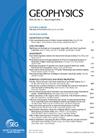用迁移学习方法确定白云鄂博稀土矿化体的位置
IF 3.2
2区 地球科学
Q1 GEOCHEMISTRY & GEOPHYSICS
引用次数: 0
摘要
白云鄂博是世界上最大的稀土矿床。稀土元素的赋存与白云岩密切相关。白云岩既是稀土矿化的母岩,也是矿体。如何准确定位和表征白云岩是确定稀土元素分布和估算其储量的关键。在该地区开展了大量的地球物理工作,包括密集的地震阵列、各种电磁方法、重力和航磁测量,以及大量的岩石物性测量。为了充分利用这些地球物理方法获得的结果,发展和理解物理性质结构,提出了一种多源地球物理数据融合技术。首先,将在同一剖面上反演得到的各种物性剖面转换成具有相同分辨率和尺寸的图像;然后,采用基于迁移学习的图像自适应特征提取技术,从多源图像中提取不同尺度的特征;随后,基于局部最近邻加权平均特征融合规则重构融合图像,得到最终融合结果。这有助于识别用于检测的目标的空间外观模式。考虑到矿化白云石具有高密度、高电阻率、高磁化率的物理特性,可以在融合图像中确定其位置和形状。结果表明,白云岩的赋存深度可达1500 m,向南倾斜是白云岩的主要构造特征之一。白云岩分布预测范围与钻探揭示的地层范围一致,为预测稀土矿体分布提供了可靠依据。本文章由计算机程序翻译,如有差异,请以英文原文为准。
Determining the location of the Bayan Obo REE mineralization body by the transfer learning method
Bayan Obo is the largest rare earth element (REE) deposit in the world. The occurrence of REE is closely related to the dolomite in this area. Dolomite serves both as the mother rock of REE mineralization and the ore body. How to accurately locate and characterize dolomite is the key to determine the distribution of REE and estimate its reserves. A large amount of geophysical work has been conducted in this area, including a dense seismic array, various electromagnetic methods, gravity and aeromagnetic surveys, as well as numerous petrophysical property measurements. To fully leverage the results obtained by these geophysical methods and develop and understanding of the physical property structure, a multi-source geophysical data fusion technology was proposed. First, various physical property profiles obtained from inversion on the same profile are converted into images with identical resolution and dimension. Then, an image adaptive feature extraction technique based on transfer learning is used to extract features of different scales from multi-source images. Subsequently, the fusion image is reconstructed based on the local nearest neighbor weighted average feature fusion rule to obtain the final fusion result. This aids in identifying the spatial appearance pattern of the target for detection. Given the physical characteristics of the mineralized dolomite, which has high density, high resistivity and high magnetic susceptibility, its location and shape can be defined in the fusion image. The results indicate that the occurrence depth of dolomite can extend up to 1500 meters, and the dolomite has a southward tilt as one of its primary structural characteristics. The predicted range of dolomite distribution is consistent with the formation range revealed by drilling, making it a reliable basis for predicting the distribution of rare earth ore bodies.
求助全文
通过发布文献求助,成功后即可免费获取论文全文。
去求助
来源期刊

Geophysics
地学-地球化学与地球物理
CiteScore
6.90
自引率
18.20%
发文量
354
审稿时长
3 months
期刊介绍:
Geophysics, published by the Society of Exploration Geophysicists since 1936, is an archival journal encompassing all aspects of research, exploration, and education in applied geophysics.
Geophysics articles, generally more than 275 per year in six issues, cover the entire spectrum of geophysical methods, including seismology, potential fields, electromagnetics, and borehole measurements. Geophysics, a bimonthly, provides theoretical and mathematical tools needed to reproduce depicted work, encouraging further development and research.
Geophysics papers, drawn from industry and academia, undergo a rigorous peer-review process to validate the described methods and conclusions and ensure the highest editorial and production quality. Geophysics editors strongly encourage the use of real data, including actual case histories, to highlight current technology and tutorials to stimulate ideas. Some issues feature a section of solicited papers on a particular subject of current interest. Recent special sections focused on seismic anisotropy, subsalt exploration and development, and microseismic monitoring.
The PDF format of each Geophysics paper is the official version of record.
 求助内容:
求助内容: 应助结果提醒方式:
应助结果提醒方式:


